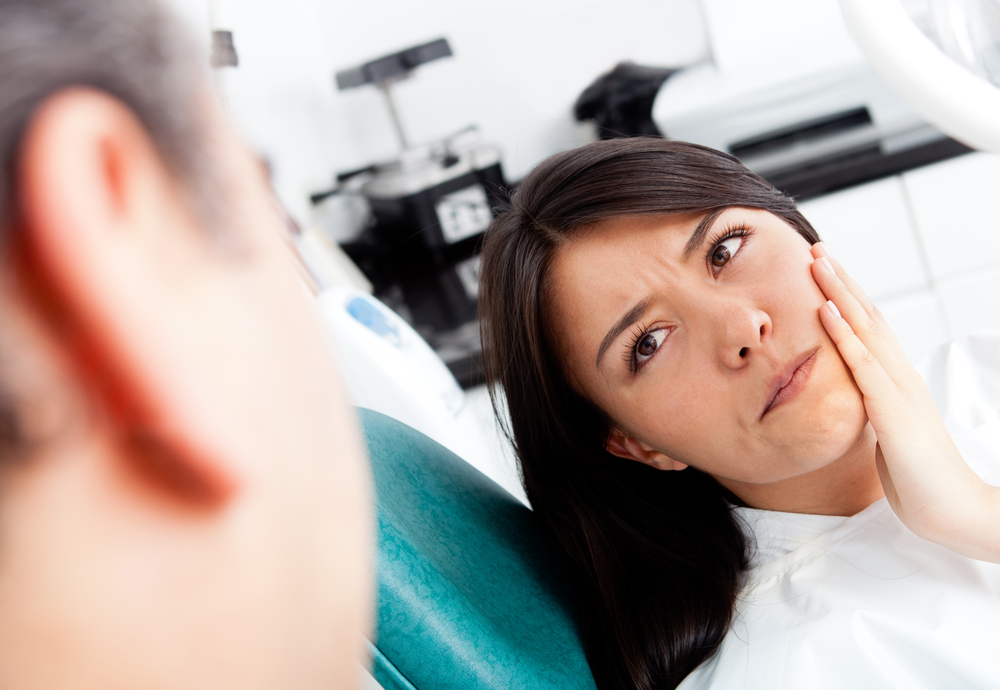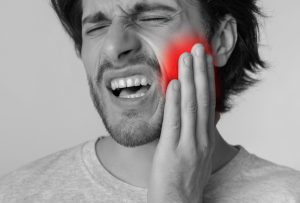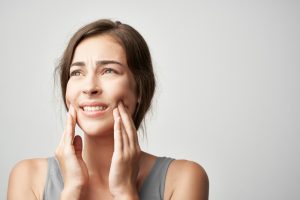

Do You Grind Your Teeth?
Are sleepless nights due to incessant teeth grinding driving you up a wall? Are morning headaches and jaw discomfort disrupting your peace? Teeth grinding, also known as bruxism, is more than just an inconvenient nightly nuisance — it has the potential to pose serious threats to your oral health if left unchecked.
In this comprehensive guide, our dentists in Staten Island dive deep into the what, why, and how of teeth grinding, exploring its causes and effects, and most importantly, reconnecting you with practical solutions to halt this uneasy habit.
What Is Bruxism?
Bruxism is a condition that causes repetitive grinding, gnashing, or clenching of teeth. While it can occur during waking hours (awake bruxism), it’s commonly associated with sleep-related movements and termed sleep bruxism. This nighttime phenomenon is often coupled with other sleep disorders, such as snoring and sleep apnea.
Individuals who grind their teeth may experience several noticeable signs, such as:
- Teeth grinding or clenching
- Flattened or damaged tooth surfaces
- Worn enamel
- Tooth pain or sensitivity
- Jaw pain or soreness
- Headaches
- Facial pain
The exact reasons behind this condition aren’t fully comprehended. It’s believed that various factors come into play including physical, psychological, and genetic elements.
Causes and Triggers of Teeth Grinding
Understanding the causes and triggers of teeth grinding is crucial in developing effective strategies for prevention and treatment. By addressing the root causes, individuals can take proactive steps to manage bruxism and mitigate its negative effects on oral health and overall well-being.
Misaligned or Missing Teeth
Misaligned or missing teeth can play a role in initiating bruxism. The imbalance in the bite may lead to subconscious attempts at self-adjustment during sleep through grinding or clenching. When the upper and lower teeth don’t fit together harmoniously, it can lead to excessive pressure on the jaw muscles, causing them to tense up and grind.
Lifestyle Habits
Certain lifestyle habits can act as triggers for teeth grinding. Excessive consumption of stimulants like caffeine or alcohol can overstimulate the central nervous system, heightening the likelihood of bruxism episodes during sleep. Similarly, recreational drug use can also contribute to increased teeth grinding.
Stress and Anxiety
Stress and anxiety have been widely associated with bruxism. Individuals experiencing high levels of emotional strain may subconsciously clench or grind their teeth as a way to release tension or frustration. The intensity of teeth grinding can vary depending on the level of emotional distress experienced by an individual.
Sleep Disorders
In some cases, sleep disorders like sleep apnea can also trigger teeth grinding. Sleep apnea is a condition where breathing is repeatedly interrupted during sleep, causing brief awakenings throughout the night. These arousals can lead to episodes of teeth grinding as the body attempts to regain normal breathing patterns.
When it comes to sleep-related bruxism, studies have found that it often occurs during arousals from deep sleep stages. These arousals can be prompted by various factors like obstructive breathing patterns, muscle activation triggered by neurological disturbances, or even loud snoring. Consequently, these disruptions lead to repeated episodes of tooth grinding during the night.
Symptoms of Teeth Grinding
When it comes to recognizing the signs of teeth grinding, there are several key indications to watch out for.
- Headaches, especially in the morning. If you frequently wake up with a dull or throbbing headache, it may be due to nighttime teeth grinding.
- Jaw pain or soreness, as excessive clenching and grinding can place strain on the jaw joint.
- Tooth sensitivity. Teeth grinding can wear down the enamel of your teeth over time, exposing the sensitive dentin underneath and leading to increased sensitivity to hot or cold temperatures.
- Fattened or worn-down tooth surfaces
- Chipped or fractured teeth
- Visible cracks in dental restorations like fillings or crowns
- Changes in bite alignment or shifting teeth
These indicators are worth paying attention to as they could point toward ongoing teeth grinding habits.
Not everyone experiences noticeable symptoms right away. In some cases, individuals may only become aware of their teeth grinding habits when informed by a partner who hears the sounds during sleep. Regular dental check-ups can also help identify early signs of bruxism through examinations and discussions about any related concerns.
Treatments for Teeth Grinding
Dealing with the problem of teeth grinding requires proactive measures to prevent further damage and alleviate discomfort.
Night Guards or Splints
One of the primary treatment options is the use of night guards or splints. These custom-made devices are typically worn while sleeping to provide a protective barrier between the upper and lower teeth. Night guards are designed to absorb the pressure created by grinding or clenching, thereby protecting your teeth from excessive wear and damage. They can be made from various materials, such as acrylic or laminate, depending on your specific needs.
It’s important to note that while over-the-counter mouthguards may be readily available, it’s recommended to consult with a dentist who can provide personalized recommendations based on your symptoms and ensure proper fit and functionality.
Botox Injections
In some cases, a dentist may recommend Botox injections as a treatment for severe teeth grinding. Botox works by temporarily paralyzing the muscles responsible for jaw movement, reducing the intensity of grinding or clenching. This option is usually considered when other interventions have been ineffective or when there is evidence of significant muscle hypertrophy in the jaw area.
However, it’s important to note that Botox injections come with potential side effects and require regular follow-up visits.
Stress Management
For individuals whose teeth grinding is thought to be caused by stress or anxiety, stress management techniques may also be beneficial. Engaging in relaxation exercises, such as deep breathing exercises, meditation, or yoga, can help mitigate the underlying emotional triggers that contribute to bruxism.
Lifestyle Changes
Making certain lifestyle changes such as avoiding caffeine and alcohol before bed, practicing good sleep hygiene, and maintaining a well-balanced diet can support overall well-being and potentially reduce teeth grinding habits.
Clinical Solutions
In some cases, when teeth grinding is severe or causing significant damage, a dentist may recommend other clinical solutions. This could include orthodontic treatments to correct bite misalignment or dental procedures like crowns or reshaping to restore damaged teeth. In rare instances, if stress or anxiety is the primary cause and other methods have been ineffective, a healthcare professional might suggest therapy or counseling to address the root causes of bruxism.
Schedule an Appointment Today
If you’re a teeth grinder, visit our Staten Island dentists today. They’ll evaluate your oral health and recommend treatment options to help alleviate teeth grinding and its symptoms. Contact us today by calling (718) 948-5111 and scheduling an appointment.



